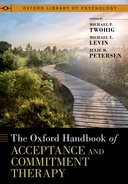 The Oxford Handbook of Acceptance and Commitment Therapy
The Oxford Handbook of Acceptance and Commitment Therapy
Contents
-
-
-
-
-
-
-
-
-
-
-
Introduction Introduction
-
Obsessive-Compulsive Disorder Obsessive-Compulsive Disorder
-
Body-Focused Repetitive Behaviors Body-Focused Repetitive Behaviors
-
Hoarding Disorder Hoarding Disorder
-
Body Dysmorphic Disorder Body Dysmorphic Disorder
-
Cognitive-Behavioral Therapy and Exposure and Response Prevention Cognitive-Behavioral Therapy and Exposure and Response Prevention
-
Acceptance and Commitment Therapy Acceptance and Commitment Therapy
-
Measures for ACT and Obsessive-Compulsive and Related Disorders Measures for ACT and Obsessive-Compulsive and Related Disorders
-
Empirical Support for ACT and Obsessive-Compulsive and Related Disorders Empirical Support for ACT and Obsessive-Compulsive and Related Disorders
-
Obsessive-Compulsive Disorder Obsessive-Compulsive Disorder
-
Body-Focused Repetitive Behaviors (Trichotillomania and Excoriation Disorder) Body-Focused Repetitive Behaviors (Trichotillomania and Excoriation Disorder)
-
Hoarding Disorder Hoarding Disorder
-
Body Dysmorphic Disorder Body Dysmorphic Disorder
-
-
Traditional CBT Technology from an ACT Perspective Traditional CBT Technology from an ACT Perspective
-
Exposure Exposure
-
Habit Reversal Training Habit Reversal Training
-
Awareness Training Awareness Training
-
Competing Response Training Competing Response Training
-
-
Future Directions Future Directions
-
References References
-
-
-
-
-
-
-
-
-
-
-
-
-
-
-
-
16 Obsessive Compulsive and Related Disorders
Get accessEric B. Lee, PhD, Assistant Professor, School of Psychological and Behavioral Sciences, Southern Illinois University, Carbondale
Myles Arendtson, BA, Graduate Student, School of Psychological and Behavioral Sciences, Southern Illinois University, Carbondale
Andy Wall, BS, Graduate Student, School of Psychological and Behavioral Sciences, Southern Illinois University, Carbondale
-
Published:19 December 2022
Cite
Abstract
Obsessive compulsive disorder (OCD) and related disorders share many functional components and are often comorbid with one another. Acceptance and commitment therapy (ACT) for OCD and related disorders is described and is situated as a version of cognitive-behavioral therapy. Also described are the key psychological inflexibility measures for each of these disorders and the outcomes work with OCD and related disorders. Research supports ACT and ACT plus exposure therapy for OCD, and ACT plus habit reversal as a treatment for trichotillomania. The work in skin picking, hoarding disorder, and BDD is limited but is growing. Finally, guidance on the integration of ACT with exposure exercises and habit reversal, as well as future directions for work in this area, are presented.
Sign in
Personal account
- Sign in with email/username & password
- Get email alerts
- Save searches
- Purchase content
- Activate your purchase/trial code
- Add your ORCID iD
Purchase
Our books are available by subscription or purchase to libraries and institutions.
Purchasing information| Month: | Total Views: |
|---|---|
| January 2023 | 3 |
| February 2023 | 3 |
| March 2023 | 7 |
| April 2023 | 8 |
| May 2023 | 8 |
| July 2023 | 14 |
| August 2023 | 10 |
| September 2023 | 10 |
| October 2023 | 12 |
| November 2023 | 6 |
| December 2023 | 17 |
| January 2024 | 13 |
| February 2024 | 11 |
| March 2024 | 8 |
| April 2024 | 12 |
| May 2024 | 25 |
| June 2024 | 6 |
| July 2024 | 5 |
| August 2024 | 12 |
| September 2024 | 14 |
| October 2024 | 7 |
| November 2024 | 7 |
| December 2024 | 2 |
| January 2025 | 19 |
| February 2025 | 9 |
| March 2025 | 19 |
| April 2025 | 9 |
| May 2025 | 6 |

Get help with access
Institutional access
Access to content on Oxford Academic is often provided through institutional subscriptions and purchases. If you are a member of an institution with an active account, you may be able to access content in one of the following ways:
IP based access
Typically, access is provided across an institutional network to a range of IP addresses. This authentication occurs automatically, and it is not possible to sign out of an IP authenticated account.
Sign in through your institution
Choose this option to get remote access when outside your institution. Shibboleth/Open Athens technology is used to provide single sign-on between your institution’s website and Oxford Academic.
If your institution is not listed or you cannot sign in to your institution’s website, please contact your librarian or administrator.
Sign in with a library card
Enter your library card number to sign in. If you cannot sign in, please contact your librarian.
Society Members
Society member access to a journal is achieved in one of the following ways:
Sign in through society site
Many societies offer single sign-on between the society website and Oxford Academic. If you see ‘Sign in through society site’ in the sign in pane within a journal:
If you do not have a society account or have forgotten your username or password, please contact your society.
Sign in using a personal account
Some societies use Oxford Academic personal accounts to provide access to their members. See below.
Personal account
A personal account can be used to get email alerts, save searches, purchase content, and activate subscriptions.
Some societies use Oxford Academic personal accounts to provide access to their members.
Viewing your signed in accounts
Click the account icon in the top right to:
Signed in but can't access content
Oxford Academic is home to a wide variety of products. The institutional subscription may not cover the content that you are trying to access. If you believe you should have access to that content, please contact your librarian.
Institutional account management
For librarians and administrators, your personal account also provides access to institutional account management. Here you will find options to view and activate subscriptions, manage institutional settings and access options, access usage statistics, and more.